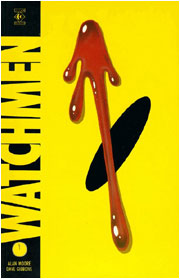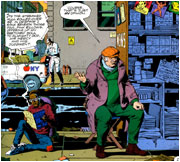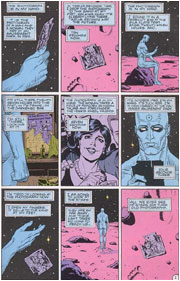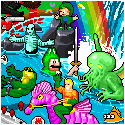Weeklies



Comic: "Watchmen"
Published by: DC Comics
Written by: Alan Moore
Artist: Dave Gibbons
Reviewer: Protoclown
Posted: 3/27/2008
Plot: In an alternate 1985, the murder of masked hero The Comedian sets in motion an investigation by his former costumed hero allies, who uncover a disturbing plot that threatens the entire world as the shadow of nuclear war looms between the United States and Soviet Union.
Review: Ask ten hardcore comic geeks what the best comic book ever made is, and over half of them will say Watchmen without even hesitating. Back in 1986 there were two comic books that really shook up the industry in their novel approach to portraying superheroes, and they have been endlessly imitated (but never repeated) ever since. The first of these is The Dark Knight Returns by Frank Miller. The second and more impressive of the two is Watchmen. This is one of the first comic books that actually made people who don't read comics stop and pay attention, realizing that mere funny books (superhero ones, no less!) could be considered actual literature with lasting artistic merit.
Alan Moore is widely considered to be the best writer who has ever worked in comics, and Watchmen is certainly the biggest and brightest feather in his cap, even as nice as some of the other feathers might be. This is the most elegantly constructed comic book I have ever read; every page, every panel, every image and word is painstakingly placed with such absolute, deliberate purpose that the design and layout of the story is an artform in and of itself.
Watchmen rewards multiple readings, as the book is chock full of so much hidden symbolism, visual clues and "Easter eggs" that you couldn't possibly catch them all the first time through, simply because you don't know what to be looking for. Moore's script for the first 32-page issue was over 100 pages, and after you see how deliberate every image and word is, you will see why (of course, Moore is also mad as a lark, which is part of what makes him so damned brilliant). The book also features a fascinating example of allegorical metafiction, in the form of a comic book being read by a character within the comic called "Tales of the Black Freighter", which serves as a foil to the book's main plot, following the story of a doomed mariner racing home to save his family from the impending attack of the same supernatural Black Freighter that waylaid him at sea.
I don't want to reveal much about the plot here, but throughout the story you are introduced to a variety of costumed heroes, some young and still active, some old and long retired. Moore presents the idea of superheroes, or "costumed adventurers" as they call themselves, in a very realistic manner: only one character has proper super powers, and his origins are a lot more plausible than most other comic characters. Moore develops each of his heroic characters by devoting a single issue to each of them that delves into their backstories, giving each one a surprising amount of character depth. Each of the heroes is deeply flawed in a very compelling manner, and not a single one of them is boring.
Also included to flesh out the story are supplemental pages at the end of all but the last issue, which include bonus exposition like excerpts from an autobiography by one of the retired characters, a psych evaluation of one of the characters, articles from magazines referenced in the book, and more. Many readers would probably skip these pages, considering them to be "boring" or unnecessary, but those readers are missing out, because Moore does a lot of his world-building here, fleshing out the details of the setting in a very natural way here rather than trying to shoehorn them into the body of the story itself. I'd say you could enjoy the book while skipping these sections, but you would lack a complete appreciation or understanding of it if you did.
And I can't possibly wrap up this review without mentioning the art. Dave Gibbons was the absolute perfect choice of artist for a book with this kind of weight to it. His work is crisp, clean, immensely detailed, and he's capable of conveying great ranges of emotion in his characters' faces. But most importantly, he understood what Moore was trying to do, and not only did he go along with it, but he enhanced it greatly with his involvement. Reading interviews with the creators indicates that they shared a great rapport while working on this book, and Moore didn't merely dicate things for Gibbons to slavishly reproduce on paper. Rather, Gibbons added a great deal of depth to this story with his own ideas, panel arrangements, and the subtle and not-so-subtle symbolism that permeates the book. The result is a very different finished product than what you would get if say, an asshat like Rob Liefeld had done the art chores. People might have remembered the book as a pretty neat yarn, but without nearly the level of impact it carries now.
If you've been meaning to check out comics but don't know where to start, this is the perfect introduction, but also the one of the highest watermarks of what comics are capable of that film and other print media are not. And if you consider yourself a comic book fan but somehow haven't read this, shame on you. Put down those X-Men comics, go to the store right now and pick up the trade paperback (or, if you can afford it, the excellent Absolute Edition--believe me, it's worth it) and read it post haste, before I make you turn in your comic geek badge. Because you haven't earned it yet.
I also feel like I can't help but at least mention the movie that's coming out next year. 300 director Zack Snyder has shown that he knows how to visually reproduce a comic book on screen, and the fact that he rejected the crappy script that translated it into modern times and made the big scary threat terrorism rather than Communism gives me the slightest glimmer of hope that I won't be compelled to slash my wrist in the theater. But a two (or even three) hour movie cannot possibly contain the depth of these twelve issues, and there's no way it's not going to be watered down by Hollywood and diluted into something that loses all significance. And the pirate comic metafiction cannot possibly be reproduced faithfully on film, as turning it into a comic within a movie or even an animated movie within a movie just won't have the same effect.
Moore has always argued (and proved, if you look at the other movie adaptations of his work) that comics as a medium, through their combination of still images and printed words, are capable of achieving things that are unique to comic books. The whole point is that Watchmen as it was designed and meant to be experienced cannot be turned into a movie, or an audio book, or a stage play or anything other than a comic. Which is why it will be better than the movie, it's better than the movie now, and it was already better than the movie before it ever even got the green light.
Overall rating: ![]()
![]()
![]()
![]()
![]()
(Scored on a 0.5 - 5 pickles rating: 0.5 being the worst and 5 being the best)
Reader Comments
sigh, it's fearful times i live in now...
Watchmen is an amazing story, and a great example of just what a comic book can be.
The only other comic that I've read on this level (which I highly recommend) is the manga "Buddha" by Osamu Tezuka.
Anyway, I am not looking forward to the Watchmen movie. As everyone has said, the story is so thoroughly designed to take advantage of being a comic that there's no way a film could come close to being a decent adaptation.
A 12-24 episode animated series would be close, but still not the same (it still wouldn't have the 'articles' that fleshed things out).
I do have a question, though. What does the "Absolute Edition" have that the regular paper-back doesn't?
Also, did anyone know this was on Time magazine's 100 best novels list?
OK, I'll shut up, now.
I also want to know if the "Absolute Edition" is really worth it. I have the trade paper-back, so I really can't justify blowing $100 on what I already have.
Also, I can't believe you started your review with the phrase "In an alternate 1985" and yet resisted the temptation to make a joke about Biff Tannen.
D-Mon: If my mentioning Rob Liefeld's name distracted you, just pretend I mentioned someone else. I was merely invoking the name of a crap artist to contrast to Gibbons. If you haven't read Watchmen, you definitely should.
BakaGaijin: I'm willing to give the Watchmen movie a chance, but I'm not getting my hopes up. I actually enjoyed V For Vendetta, despite it being a dumbed down version of the book.
BurntToShreds: These days you can find quite a lot of comics in libraries, whether good or not, so that alone is not necessarily a mark of quality. I guess I'm saying just be wary of other things you might see in the library. And there are college courses that teach Watchmen.
IHeartApathy: See, that concerns me. I heard they were going to do an animated Black Freighter short film that would be an extra on the DVD. It's such an important part of the story though that I wonder how the movie will suffer from its absence.
Doctor_Who: That's a damn good point about the Biff Tannen joke. I really dropped the ball there, didn't I?
On the other hand, all the "behind the scenes" stuff does sound really cool.
I don't have my hopes up about the movie, but lately I've been thinking that I am pretty curious as to what the characters look like in live-action. I hope they keep the costume design similar to the original.
Interestingly enough, I think I liked the little book segments and psyche evaluation and what not between the comics more than the comics themselves (well, it varies from read-through to read-through). I really love how Moore went all out on this world, and I would buy a copy of Under the Hood in a heartbeat.
And then there's the movie. I did get a fair amount of enjoyment out of LXG, and I really love V for Vendetta (sure, it's pretty dumbed down in some aspects, like it was pointed out, but it's still a really good movie), but I'm really nervous about Watchmen. There simpl is too much there to present onscreen. The early costume designs look pretty good, though, so that's something (oh, and Protoclown, Snyder said in an interview that he wanted to include The Black Freighter, but it would only be in there in such a way that it could be removed and put on the DVD if need be. At least, I think that's what he said; there's a link on Wiki). Oh well, just crossing my fingers now and hoping for the best.
I was sort of iffy about the Black Freighter parts though. When I was reading through, I was intrigued by the characters and the mystery, but then would get sidetracked and annoyed when they cut to the Black Freighter. I suppose it was meant to relate to the story of one of the characters, but I didn't really dig it.
Still worth reading, though!
Follow us on:
![]()
![]()
![]()
![]()
Want Your Ad Here?
Send us an email!





